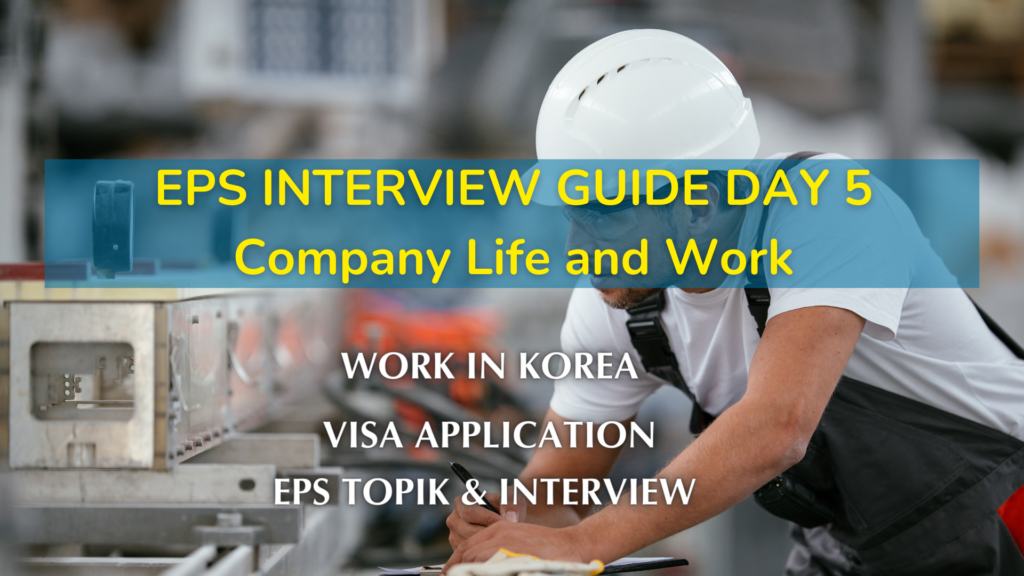
Lesson Timetable
Day 1: Self-introduction
Day 2: Direction and Instructions
Day 3: Personal Information
Day 4: Basic Knowledge
Day 5: Company Life and Work
Day 6: EPS Tools
DAY 5 EPS Lesson Brief
Let’s test whether you can handle corporate life well. You will be asked about how well you can navigate urgent situations and interact smoothly with colleagues and superiors. You will be asked about how you handle emergency situations too.
These questions are not too difficult or complex. So, if you can memorize example sentences from this book perfectly, you will be able to pass the interview eventually.
Vocab
Question Bank
🔊 Q: What would you do if your colleague is busy?
직장동료가 바쁘면 어떻게 할 거예요?
[jikjjangdongnyoga bappeumyon ottoke hal kkoeyo]
🔊 A: I’ll finish what I’m doing quickly and help my colleague.
제가 하는 일을 빨리 끝내고 도와주겠습니다.
[jega haneun ireul ppalri kkeunnaego dowajugetsseumnida]
🔊 Q: How are you going to get along with your colleagues?
직장 동료하고 어떻게 지낼 거예요?
[jikjjang dongnyohago ottoke jinael kkoeyo]
🔊 A: I will be considerate of my colleagues and get along well.
배려하면서 사이 좋게 지내겠습니다.
[baeryohamyonso sai joke jinaegetsseumnida]
🔊 Q: What are you going to do if you have a lot of work?
회사 일이 많으면 어떻게 할 거예요?
[hwesa iri maneumyon ottoke hal kkoeyo]
🔊 A: I’ll work overtime until I’m done.
일을 다 끝낼 때까지 잔업하겠습니다.
[ireul da ggeunnael ddaeggaji janeobhagessumnida]
🔊 Q: What will you do if your supervisor disagrees with you?
상사가 내 의견에 반대하면 어떻게 할 거예요?
[sangsaga nae uigyone bandaehamyon ottoke hal kkoeyo]
🔊 A: I will follow the boss’s instructions or company policy.
사장님의 지시나 회사 방침에 따르겠습니다.
[sajangnime jisina hwesa bangchime ttareugetsseumnida]
🔊 Q: What will you do if you make a mistake while working?
일을 하다가 실수하면 어떻게 할 거예요?
[ireul hadaga silssuhamyon ottoke hal kkoeyo]
🔊 A: I’ll report it to my supervisor and try not to make the mistake again.
상사에게 보고하고 다시 실수 하지 않게 노력하겠습니다.
[sangsaege bogohago dasi silssu haji anke noryokagetsseumnida]
🔊 Q: What will you do if there is a defective product?
불량품이 있으면 어떻게 할 거예요?
[bulryangpumi isseumyon ottoke hal kkoeyo]
🔊 A: I’m gonna report it to my supervisor and find a solution.
상사에게 보고하고 해결 방법을 찾겠습니다.
[sangsaege bogohago haegyol bangbobeul chatggessummida]
🔊 Q: What are you going to do if you get into an accident while working?
작업 하다가 사고가 나면 어떻게 할 거예요?
[jagop hadaga sagoga namyon ottoke hal kkoeyo]
🔊 A: I’ll call my colleague next to me out loud.
큰 소리로 옆의 동료를 부르겠습니다.
[keun soriro yope dongnyoreul bureugetsseumnida]
🔊 Q: What will you do if there is a problem with the machine?
기계에 문제가 생기면 어떻게 할 거예요?
[gigyee munjega saenggimyon ottoke hal kkoeyo]
🔊 A: I’ll report it to my supervisor and ask for a repair.
상사에게 보고하고 수리 요청하겠습니다.
[sangsaege bogohago suri yochonghagetsseumnida]
🔊 Q: What time will you arrive at work by?
회사에는 몇시까지 도착할 거예요?
[hwesaeneun myotssikkaji dochakal kkoeyo]
🔊 A: I’ll be there 30 minutes before work hours.
근무시간 30분 전까지 도착하겠습니다.
[geunmusigan samsipppun jonkkaji dochakagetsseumnida]
🔊 Q: What are you going to do if there’s a fire in the factory?
공장에 불이 나면 어떻게 할 거예요?
[gongjange buri namyon ottoke hal kkoeyo]
🔊 A: I’ll call 119.
119에 신고하겠습니다.
[ililkue singohagetsseumnida]
🔊 Q: Do you know anything about Korea?
한국에 대해 아는게 있어요?
[hanguge daehae aneunge isseoyo?]
🔊 A: Although Korea is a small country, it has developed greatly in a short time.
한국은 작은 나라지만 짧은 시간에 크게 경제 발전을 한 나라라고 들었습니다.
[hangugeun jageun nalajiman jjalbeun sigane keuge gyeongje baljeoneul han nalarago deurossumnida]
FREE EPS Lesson (Video)
Finally, the concluding step after the interview holds significance. When the interview concludes, the interviewer typically expresses gratitude by saying, “Thank you for your efforts” or ‘수고했어요’. In response, the interviewee should reply with “Thank you” or ‘수고하셨습니다’ and promptly exit without displaying hesitation. Following this, a slight bow is appropriate as a gesture of respect. This practice reflects cultural manners in Korea.
Table of Contents

